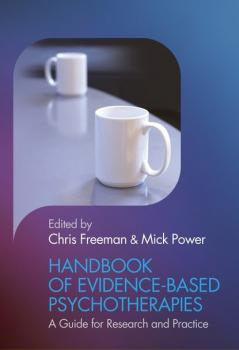Mick Power
Список книг автора Mick PowerHandbook of Cognition and Emotion
Edited by leading figures in the field, this handbook gives an overview of the current status of cognition and emotion research by giving the historical background to the debate and the philosophical arguments before moving on to outline the general aspects of the various research traditions. This handbook reflects the latest work being carried out by the key people in the field.
Handbook of Evidence-based Psychotherapies
At a time when evidence is everything, the comprehensive Handbook of Evidence-Based Psychotherapies handbook provides a unique, up-to-date overview of the current evidence-base for psychological therapies and major psychological disorders. The editors take a pluralistic approach, covering cognitive and behavioural therapies as well as counselling and humanistic approaches. Internationally-renowned expert contributors guide readers through the latest research, taking a critical overview of each practice’s strengths and weaknesses. A final chapter provides an overview for the future.
The Wiley-Blackwell Handbook of Mood Disorders
The Wiley-Blackwell Handbook of Mood Disorders, 2/e reflects the important and fast-changing advancements that have occurred in theory and practice in unipolar and bipolar mood disorders. There is no other current reference that gathers all of these developments together in a single book Every chapter is updated to reflect the very latest developments in theory and practice in unipolar and bipolar mood disorders Includes additional chapters which cover marital and family therapy, medical disorders and depression, and cross-cultural issues Contributions are from the world's leading authorities, and include psychiatrists and clinical psychologists with experience in both research and in practice Focuses on innovations in science and clinical practice, and considers new pharmacological treatments as well as psychological therapies
Adieu to God. Why Psychology Leads to Atheism
Adieu to God examines atheism from a psychological perspective and reveals how religious phenomena and beliefs are psychological rather than supernatural in origin. Answers the psychological question of why, in the face of overwhelming scientific evidence to the contrary, do religions continue to prosper? Looks at atheism and religion using a fair and balanced approach based on the latest work in psychology, sociology, anthropology, psychiatry and medicine Acknowledges the many psychological benefits of religion while still questioning the validity of its supernatural belief systems and providing atheist alternatives to a fulfilling life



